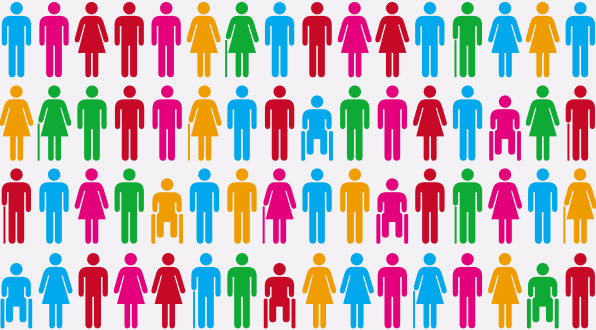Get moving for people with disabilities
Engage with people with disabilities!
As part of the Choose your cause programme, the employees of TMB have chosen to support the disabled as their cause for 2016. The TMB Foundation has designed a series of actions in collaboration with member organisations of the Catalan Committee of Representatives of People with Disabilities (COCARMI), which will be undertaken in the fourth quarter of the year. This is a TMB Solidarity project.
Don’t know what to do when you come across a disabled person? The members of COCARMI tell you:
General advice
- Trust me. Start by rejecting any stereotype or prejudice you may have been harbouring about people with disabilities.
- We’re all different. Just because you know one disabled person, it doesn’t mean we all have the same disability.
- Treat me according to my age. If I’m not a child, don’t treat me like one.
- Speak slowly and clearly so I can understand you.
- Be patient: give me time and I’ll answer you.
- Talk to me, not my companion.
- If we’re together, walk beside me, at my pace. If we stop, make sure you’re at my level and look me in the eyes.
- Don’t invade my personal space.
People with reduced mobility
- Make sure you’re at my level as we speak.
- You can offer to push my chair, but don’t do it without asking first, and don’t lean on it or hang things on it without telling me.
- If I use sticks or prostheses, walk at my pace.
Deaf people
- Look straight at me, close up and don’t cover or put objects in your mouth (chewing gum, pen...). Don’t move or turn your head while you are talking.
- Speak normally: enunciate clearly, but don’t exaggerate or shout.
- Use normal gestures to communicate: it will help.
- Make sure I have understood you. If necessary, use a pen and paper or repeat what you’ve said.
- I also sign.
- For me, contact is a means of communication, don’t take offence if I touch you.
Blind or partially sighted people
- Please don’t grab me or shout at me.
- If you want to help me, offer me your arm and I’ll take it.
- If you want to guide me, stand on the opposite side from where I have my stick or my guide dog.
- Warn me about any uneven surfaces or changes in direction and give me any important information about the journey.
Deaf-blind people
- Many of us, but not all, have a white stick with two red stripes to differentiate us from people who are only blind or partially sighted.
- Most of us use tactile sign language.
- If you see that we are getting about on our own, it's best not to disturb us.
- We are often accompanied by a guide or mediator. Please don't get between us, we need them to get about.
- We sometimes have communication tablets or signs with messages. You can touch the sign with the relevant message on.
Video of the presentation of the "Get moving for people with disabilities" campaign.
Activities in October
Sports and disabilities
- Sunday 2nd at 9.30 am in the Les Corts district: “En marxa per la paràlisi cerebral”, a race in aid of cerebral palsy organised by Ipsem Pharma and FEPCCAT.
- Tuesday 4th at 7.00 pm in Mundet metro station lobby: ceremony to present the cause with institutional representatives and guests from disabled associations and TMB.
- Friday 14th at 10.00 am in bus and metro networks: accessibility measures on buses and metro with Fil a l'Agulla.
- Wednesday 19th at 10.00 am Universitat station lobby: storytelling for the disabled, with children form Eulàlia Bota school.
- Sunday 30th at 10.00 am in Parc de la Infanta, in Cornellà de Llobregat: giving up is not an option, an inclusive sports day organised by the Corresolidaris association. Registration.
Activities in November
Women and disability
- Monday 25th at 10.30 am in the ONCE Catalunya lecture hall: talk-discussion on gender violence and disability.
Activities in December
Rights of people with disabilities
- Monday 5th, in Diagonal station: opening of an exhibition on the rights of people with disabilities.
- Wednesday 21st, at 6.00 pm, in the Sala Gaudí: "Children and autism", talk-discussion, by the Mirada Neta association.
In collaboration with:
The Catalan Committee of Representatives of People with Disabilities (COCARMI) is a Catalan non-profit association created in 1998 to defend the rights of the disabled and their families.
COCARMI is the representative platform for the disability sector that organises associations in Catalonia. Since it was founded it has worked for full inclusion of the disabled in all areas of life (social, labour, education, culture, communication, etc.) on an equal footing with the rest of society.
COCARMI comprises 10 federations and associations that provide a voice in Catalonia for people with disabilities, whether physical, organic, intellectual, sensorial or mental.
More information on the COCARMI website.










